句子倒装
句子的倒装和省略

句子的倒装和省略句子的倒装是英文语法中常见的一种表达形式,指的是动词与主语的位置颠倒,倒装的方式有两种:完全倒装和部分倒装。
同时,省略也是英文语法中常见的一种表达手法,指的是在句子中省略掉某些成分,使得句子更加简洁明了。
在本文中,我们将探讨句子的倒装和省略,以及它们在语言表达中的应用。
一、句子的完全倒装完全倒装是指将谓语动词完全移至主语的前面,常用于以下几种情况:1. 当以here, there或者out等副词开头时:Here comes the bus.(车来了)There goes the bell.(铃声响了)Out came the sun.(太阳出来了)2. 当以否定副词或副词短语开头时:Never have I seen such a beautiful sunset.(我从未见过如此美丽的日落。
)Not only is he intelligent, but he is also hardworking.(他不仅聪明,而且勤奋。
)3. 当以介词短语或表示地点的副词短语开头时:In front of the house stood a tall tree.(房子前面矗立着一棵高大的树。
)On the hill lies a small village.(小山上坐落着一个小村庄。
)二、句子的部分倒装部分倒装是指只将助动词或情态动词移至主语之前,常用于以下几种情况:1. 当以否定词开头时:Never had I imagined that I would win the lottery.(我从未想过我会中彩票。
)Not only does he speak English fluently, but he also speaks French.(他不仅英语讲得流利,而且懂法语。
)2. 当以表示方式或原因的副词或短语开头时:In no way can I accept your offer.(我无论如何都不能接受你的建议。
倒装句语文
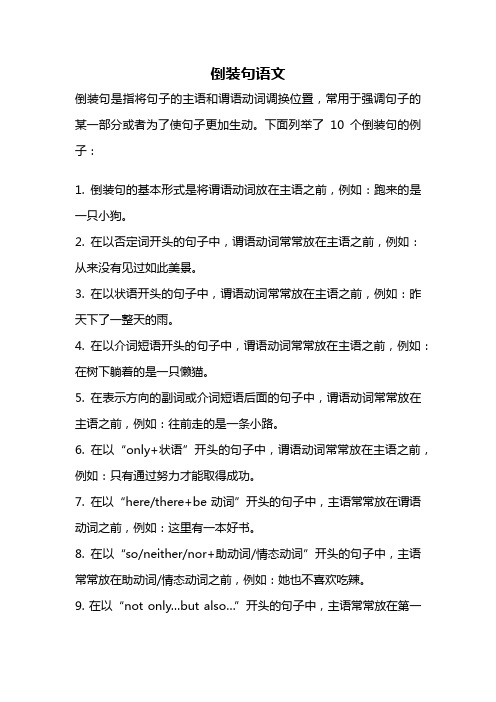
倒装句语文
倒装句是指将句子的主语和谓语动词调换位置,常用于强调句子的某一部分或者为了使句子更加生动。
下面列举了10个倒装句的例子:
1. 倒装句的基本形式是将谓语动词放在主语之前,例如:跑来的是一只小狗。
2. 在以否定词开头的句子中,谓语动词常常放在主语之前,例如:从来没有见过如此美景。
3. 在以状语开头的句子中,谓语动词常常放在主语之前,例如:昨天下了一整天的雨。
4. 在以介词短语开头的句子中,谓语动词常常放在主语之前,例如:在树下躺着的是一只懒猫。
5. 在表示方向的副词或介词短语后面的句子中,谓语动词常常放在主语之前,例如:往前走的是一条小路。
6. 在以“only+状语”开头的句子中,谓语动词常常放在主语之前,例如:只有通过努力才能取得成功。
7. 在以“here/there+be动词”开头的句子中,主语常常放在谓语动词之前,例如:这里有一本好书。
8. 在以“so/neither/nor+助动词/情态动词”开头的句子中,主语常常放在助动词/情态动词之前,例如:她也不喜欢吃辣。
9. 在以“not only…but also…”开头的句子中,主语常常放在第一
个动词之后,例如:他不仅会唱歌,还会跳舞。
10. 在以“hardly/scarcely…when…”开头的句子中,主语常常放在第一个动词之后,例如:刚出门,就下起了大雨。
以上是10个倒装句的例子,通过倒装句的运用,可以使句子更加生动有力,增强表达的效果。
倒装句是语文学习中的重要知识点,希望大家能够熟练掌握并灵活运用。
句子的倒装结构及使用场景

句子的倒装结构及使用场景句子的倒装结构是英语语法中一种常见的语序变换方式。
一般情况下,英语句子的基本语序是主语在前,谓语动词在后。
但在特定的情况下,为了强调某个词或者句子的平衡性,或者用于特殊的表达手法,可以使用倒装结构。
本文将介绍句子的倒装结构的基本形式以及使用场景。
一、基本形式1. 完全倒装结构在完全倒装结构中,谓语动词位于主语之前。
具体形式为:助动词/情态动词/系动词 + 主语 + 谓语动词 + 其他成分。
例如:- Never have I seen such a beautiful sunset.(我从来没有见过如此美丽的日落。
)- Only by working hard can you achieve success.(只有努力工作,你才能获得成功。
)2. 部分倒装结构在部分倒装结构中,仅将助动词/情态动词/系动词放在主语之前,而将谓语动词保持在原来的位置。
例如:- She can speak three languages, so can he.(她会说三种语言,他也会。
)- He is a doctor, and so is his brother.(他是个医生,他弟弟也是。
)二、使用场景1. 否定词位于句首当否定词位于句首时,为了强调反面意义,通常需要使用完全倒装结构。
例如:- Never have I felt so lonely.(我从来没有感到如此孤独。
)- Not only did he lose his job, but he also lost all his savings.(他不仅失去了工作,还失去了所有的积蓄。
)2. only位于句首当only位于句首时,为了强调它所修饰的词组或状语,常使用完全倒装结构。
例如:- Only in this way can we improve our English.(只有通过这种方式,我们才能提高我们的英语。
)- Only after the rain stops can we go out to play.(只有等雨停了,我们才能出去玩。
句法 第六章 倒装句

4. Not until he began to work ___that he had wasted so much time.
A.didn’t he realize B. he didn’t realize C. did he realize D. he realize
5. Hardly ___the station when the train started.
2.部分倒装
(4) so/such..that句型中,若so/such放在句首,则需要部分倒装(前倒后不倒) Eg1:So shallow is the lake that no fish can live in it.
He is such a clever student that he has made great progress in English. Such a clever student is he that he has made great progress in English.
15.Never before ___ such impressive music.
A.did I hear B.have I heard C.I heard D.I have heard
A.is the cat B.the cat is C.does the cat D.did the cat
13.Only when everyone knows how serious the problem is ___ .
A.the battle will be won B.the battle has been won
11. ____, with tears in her eyes.
全部倒装的句子
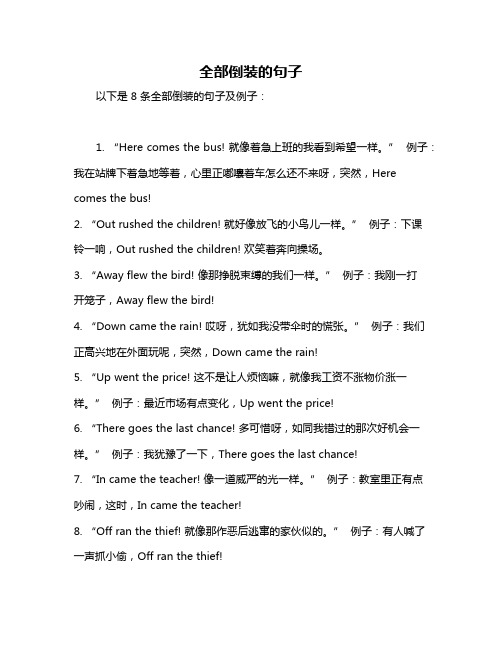
全部倒装的句子以下是 8 条全部倒装的句子及例子:1. “Here comes the bus! 就像着急上班的我看到希望一样。
” 例子:我在站牌下着急地等着,心里正嘟囔着车怎么还不来呀,突然,Here comes the bus!2. “Out rushed the children! 就好像放飞的小鸟儿一样。
” 例子:下课铃一响,Out rushed the children! 欢笑着奔向操场。
3. “Away flew the bird! 像那挣脱束缚的我们一样。
” 例子:我刚一打开笼子,Away flew the bird!4. “Down came the rain! 哎呀,犹如我没带伞时的慌张。
” 例子:我们正高兴地在外面玩呢,突然,Down came the rain!5. “Up went the price! 这不是让人烦恼嘛,就像我工资不涨物价涨一样。
” 例子:最近市场有点变化,Up went the price!6. “There goes the last chance! 多可惜呀,如同我错过的那次好机会一样。
”例子:我犹豫了一下,There goes the last chance!7. “In came the teacher! 像一道威严的光一样。
” 例子:教室里正有点吵闹,这时,In came the teacher!8. “Off ran the thief! 就像那作恶后逃窜的家伙似的。
” 例子:有人喊了一声抓小偷,Off ran the thief!我的观点结论:全部倒装的句子在表达上很有特色,可以瞬间吸引注意力,让语言更加生动有趣,让日常交流也变得更加精彩。
句子的倒装结构与常见用法
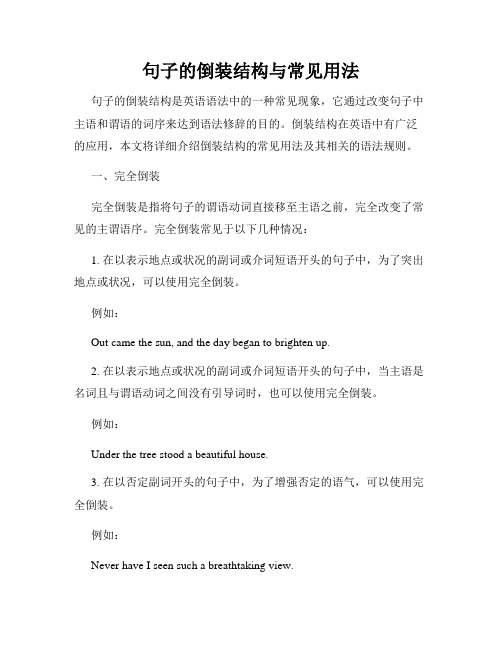
句子的倒装结构与常见用法句子的倒装结构是英语语法中的一种常见现象,它通过改变句子中主语和谓语的词序来达到语法修辞的目的。
倒装结构在英语中有广泛的应用,本文将详细介绍倒装结构的常见用法及其相关的语法规则。
一、完全倒装完全倒装是指将句子的谓语动词直接移至主语之前,完全改变了常见的主谓语序。
完全倒装常见于以下几种情况:1. 在以表示地点或状况的副词或介词短语开头的句子中,为了突出地点或状况,可以使用完全倒装。
例如:Out came the sun, and the day began to brighten up.2. 在以表示地点或状况的副词或介词短语开头的句子中,当主语是名词且与谓语动词之间没有引导词时,也可以使用完全倒装。
例如:Under the tree stood a beautiful house.3. 在以否定副词开头的句子中,为了增强否定的语气,可以使用完全倒装。
例如:Never have I seen such a breathtaking view.4. 在以“only”开头的句子中,为了强调“only”的含义,可以使用完全倒装。
例如:Only when we face our fears can we overcome them.二、部分倒装部分倒装是指将句子中的助动词、情态动词或系动词和主语之间的位置进行调换,主语通常位于动词之前。
部分倒装常见于以下几种情况:1. 在以否定词开头的句子中,为了强调否定的内容,可以使用部分倒装。
例如:Not only did she pass the exam, but she also got the highest score.2. 在以“so”或“neither/nor”开头的句子中,用于表示同样的情况或类似的选择,可以使用部分倒装。
例如:So crowded was the concert that we could hardly find a seat.3. 在含有“only”或“little”的条件状语从句中,为了强调条件的限制,可以使用部分倒装。
倒装句的三种形式
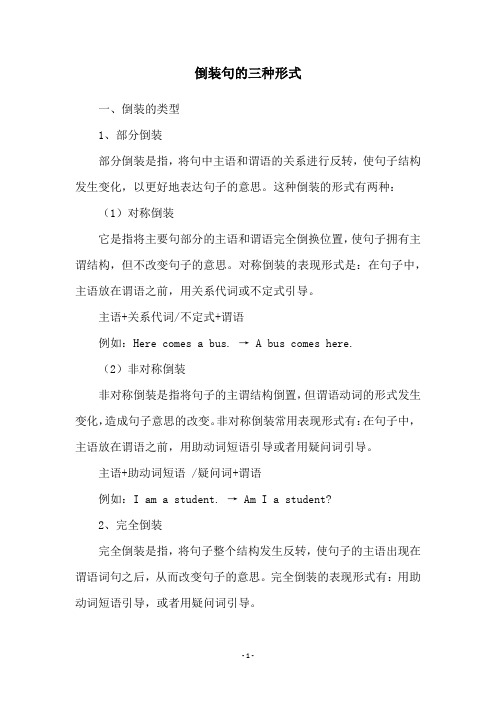
倒装句的三种形式
一、倒装的类型
1、部分倒装
部分倒装是指,将句中主语和谓语的关系进行反转,使句子结构发生变化,以更好地表达句子的意思。
这种倒装的形式有两种:(1)对称倒装
它是指将主要句部分的主语和谓语完全倒换位置,使句子拥有主谓结构,但不改变句子的意思。
对称倒装的表现形式是:在句子中,主语放在谓语之前,用关系代词或不定式引导。
主语+关系代词/不定式+谓语
例如:Here comes a bus. → A bus comes here.
(2)非对称倒装
非对称倒装是指将句子的主谓结构倒置,但谓语动词的形式发生变化,造成句子意思的改变。
非对称倒装常用表现形式有:在句子中,主语放在谓语之前,用助动词短语引导或者用疑问词引导。
主语+助动词短语 /疑问词+谓语
例如:I am a student. → Am I a student?
2、完全倒装
完全倒装是指,将句子整个结构发生反转,使句子的主语出现在谓语词句之后,从而改变句子的意思。
完全倒装的表现形式有:用助动词短语引导,或者用疑问词引导。
- 1 -。
倒装句

倒装一、概说句子主语通常是在谓语之前,这种语序称为自然语序,也叫正常语序。
若谓语动词在主语之前,这种语序称为倒装语序。
谓语动词全部置于主语前的,叫完全倒装,只有一部分(通常是助动词,情态动词或be动词)置于主语前面的,叫部分倒装。
如:She is a nice girl.(正常语序)她是一个好女孩。
Is she a nice girl?(倒装语序)她是一个好女孩吗?二、倒装的几种情况(一)完全倒装1. Here, There, Now, Then等副词放在句首时,句子要完全倒装,谓语动词常用come, go, be, lie, run 等。
例如:There comes the bus! 公共汽车来了。
There goes the train!火车走了。
Now comes your turn.现在轮到你了。
2.表示方位的副词in, out, back, up, down, off, away 等置于句首时,句子要全部倒装,句子的谓语动词常是come, go等表示运动的词。
如:The door opened and in came the headmaster.门开了,校长走了进来。
Out ran a little boy.一个小男孩跑出去了。
3.表语提到句首,采用完全倒装:“表语 + 系动词 + 主语”。
(进行时态也可这样)。
Present at the meeting are some famous scientists.出席会议的是一些著名的科学家。
Gone are the days when we used the foreign oil.我们用洋油的日子一去不返了。
Hanging on the wall is Tom's Jacket.挂在墙上的是汤姆的夹克。
Near the factory was a hospital.工厂附近有一家医院。
斯密斯先生就是这样一个人。
①上述完全倒装句子中主语若为人称代词,应放在在动词前:Here comes Mr. Lee. →Here he comes.Away went the students. →Away they went.②有时为了句子的平衡或强调,将表语置于句首,也属于全部倒装。
英语倒装句12种类型及例句
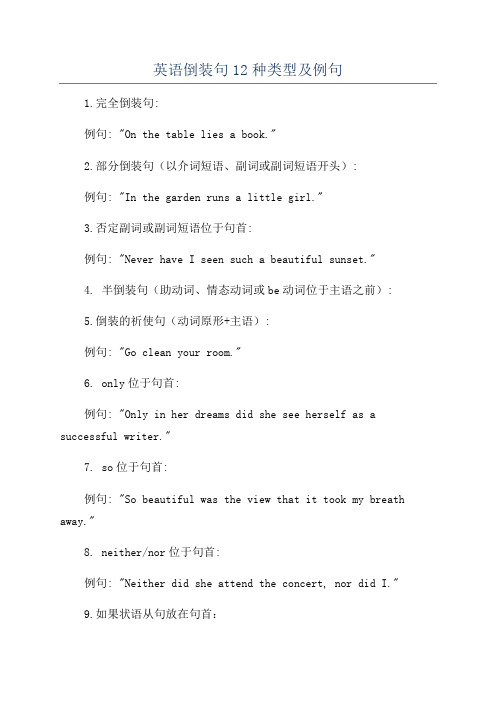
英语倒装句12种类型及例句1.完全倒装句:例句: "On the table lies a book."2.部分倒装句(以介词短语、副词或副词短语开头):例句: "In the garden runs a little girl."3.否定副词或副词短语位于句首:例句: "Never have I seen such a beautiful sunset."4. 半倒装句(助动词、情态动词或be动词位于主语之前):5.倒装的祈使句(动词原形+主语):例句: "Go clean your room."6. only位于句首:例句: "Only in her dreams did she see herself as a successful writer."7. so位于句首:例句: "So beautiful was the view that it took my breath away."8. neither/nor位于句首:例句: "Neither did she attend the concert, nor did I."9.如果状语从句放在句首:10.条件从句位于句首:例句: "Should he fail the exam, he will have to retake the course."11.介词短语或副词短语位于句首:例句: "In the corner sat a small dog."12. or/ nor引导的短语或句子位于句首:。
句子的倒装与省略

句子的倒装与省略句子的倒装与省略是英语语法中的重要部分,它们在句子结构和表达方式上带来了独特的变化。
本文将从倒装句和省略句两个方面进行探讨,并介绍它们的用法和注意事项。
一、倒装句倒装句是指将正常语序的主语和谓语动词颠倒位置,形成不同于正常语序的句子。
常见的倒装结构有两种情况:完全倒装和部分倒装。
1. 完全倒装完全倒装是将谓语动词放在主语之前,用于以下情况:a) 在以副词或短语开头的句子中,如"Never have I seen such a beautiful sunset."(我从未见过如此美丽的日落。
)b) 在以地点状语或时间状语开头的句子中,如"Down the street camea group of children."(一群孩子沿着街道走来。
)2. 部分倒装部分倒装是将助动词或情态动词与主语的位置互换,用于以下情况:a) 在含有否定副词或词组的句子中,如"Never have I been so disappointed."(我从未如此失望。
)b) 在以only、hardly、not until等副词开头的句子中,如"Only by working hard can you achieve success."(只有通过努力工作,你才能获得成功。
)二、省略句省略句是指在表达中省略掉某些成分,但仍能保持句子的完整和意义的语法结构。
常见的省略句有以下情况:1. 主语省略当主语在句子中已经明确或可通过上下文推断时,可以省略主语。
如"I like coffee, and (I) also enjoy tea."(我喜欢咖啡,而且我也喜欢茶。
)2. 谓语动词省略当句子已经有了一个谓语动词,而后面的句子也需要表达相同的动作时,可以省略后面的谓语动词。
如"I can swim, but he can't (swim)."(我会游泳,但他不会。
倒装句子知识点总结
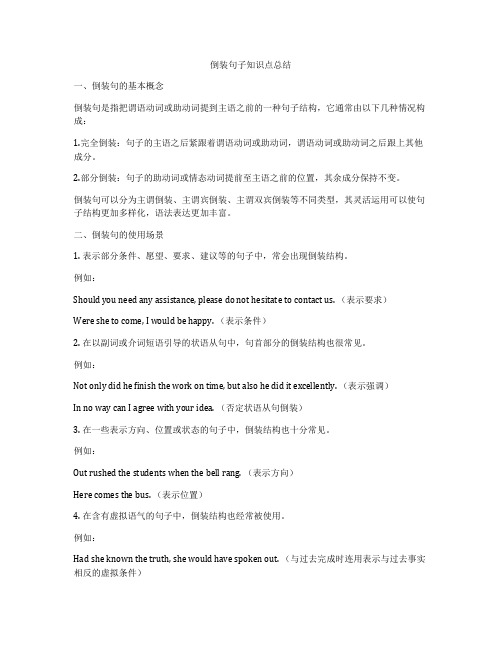
倒装句子知识点总结一、倒装句的基本概念倒装句是指把谓语动词或助动词提到主语之前的一种句子结构,它通常由以下几种情况构成:1.完全倒装:句子的主语之后紧跟着谓语动词或助动词,谓语动词或助动词之后跟上其他成分。
2.部分倒装:句子的助动词或情态动词提前至主语之前的位置,其余成分保持不变。
倒装句可以分为主谓倒装、主谓宾倒装、主谓双宾倒装等不同类型,其灵活运用可以使句子结构更加多样化,语法表达更加丰富。
二、倒装句的使用场景1. 表示部分条件、愿望、要求、建议等的句子中,常会出现倒装结构。
例如:Should you need any assistance, please do not hesitate to contact us. (表示要求)Were she to come, I would be happy. (表示条件)2. 在以副词或介词短语引导的状语从句中,句首部分的倒装结构也很常见。
例如:Not only did he finish the work on time, but also he did it excellently. (表示强调)In no way can I agree with your idea. (否定状语从句倒装)3. 在一些表示方向、位置或状态的句子中,倒装结构也十分常见。
例如:Out rushed the students when the bell rang. (表示方向)Here comes the bus. (表示位置)4. 在含有虚拟语气的句子中,倒装结构也经常被使用。
例如:Had she known the truth, she would have spoken out. (与过去完成时连用表示与过去事实相反的虚拟条件)Should I be the one chosen, I promise to work hard. (与虚拟条件连用)三、倒装句的基本结构及使用方法1. 主谓倒装在一些特殊情况下,主语和谓语的位置会倒置。
完全倒装的句子
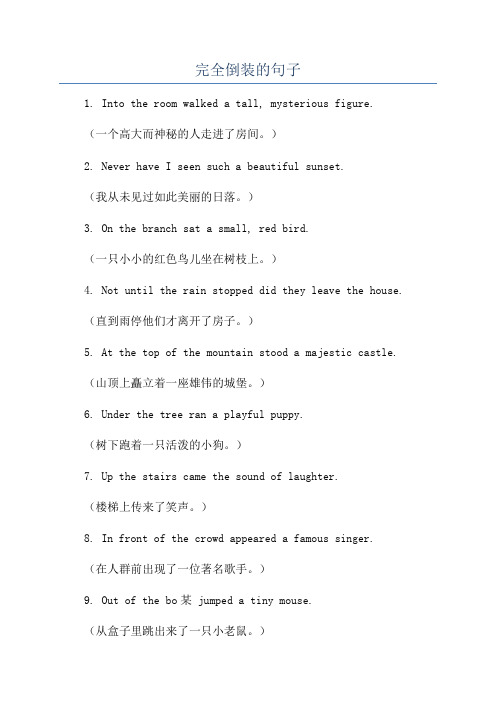
完全倒装的句子
1. Into the room walked a tall, mysterious figure.
(一个高大而神秘的人走进了房间。
)
2. Never have I seen such a beautiful sunset.
(我从未见过如此美丽的日落。
)
3. On the branch sat a small, red bird.
(一只小小的红色鸟儿坐在树枝上。
)
4. Not until the rain stopped did they leave the house.(直到雨停他们才离开了房子。
)
5. At the top of the mountain stood a majestic castle.(山顶上矗立着一座雄伟的城堡。
)
6. Under the tree ran a playful puppy.
(树下跑着一只活泼的小狗。
)
7. Up the stairs came the sound of laughter.
(楼梯上传来了笑声。
)
8. In front of the crowd appeared a famous singer.
(在人群前出现了一位著名歌手。
)
9. Out of the bo某 jumped a tiny mouse.
(从盒子里跳出来了一只小老鼠。
)
10. Off the coast sailed a majestic ship.。
什么是倒装句 怎么倒装

什么是倒装句怎么倒装倒装是一种语法手段,用于表示一定的句子结构或强调某一句子成分。
倒装句有两种:完全倒装和部分倒装。
1. 完全倒装1) 完全倒装即把整个谓语放到主语之前(是整个谓语动词,而非助动词)。
例如:In came the teacher and the class began. (老师走了进来,然后开始上课。
)2) there引出的完全倒装句:除了最常见的there be句型以外,there还可以接appear, exist, lie,remain, seem to be, stand等,一般都译成"有"的含义,构成完全倒装句。
例如:There appeared to be a man in black in the distance.(远处有个穿黑色衣服的人。
)3) 由地点和时间副词引出的完全倒装句:以地点副词here, there和时间副词now, then 开头,后面的动词是be, come, exist, fall, follow, go, lie, remain, seem, stand等,而主语又是名词时,构成完全倒装句。
Up climbed the boy when his mother came.4)表示运动方向的副词或地点状语置于句首,谓语表示运动的动词且主语是名词时使用完全倒装Out rushed a missile from under the bomber. 轰炸机肚底下窜出一枚导弹。
Out he rushed.注意:1) 在here, there引出的倒装句中,当主语是普通名词时用完全倒装句,但当主语是代词时,就要用部分倒装句。
例:Here comes the postman!(邮递员终于来了!注意实意谓语动词位于主语之前。
)Here we are.(我们到了。
注意系动词位于主语代词之后。
)2) 当主语是代词,谓语是系动词,表语是说明性的词、词组和定语从句时,可以使用完全倒装句,起强调作用。
句子的倒装与强调

句子的倒装与强调句子的倒装是英语语法中常见的现象,通过改变主语和谓语的位置,可以产生强调的效果。
倒装句在句子结构上与常规语序不同,使得表达更加生动有力。
本文将探讨句子倒装的用法、条件以及强调句的构成和作用。
一、句子的倒装1. 完全倒装完全倒装是指将谓语动词完全放在主语前面。
通常,完全倒装常见于以下情况:a. 状语放在句首例如:On the wall hung a beautiful painting.(墙上挂着一幅漂亮的画。
)b. 地点状语放在句首例如:In front of the classroom stood the teacher.(教室前面站着老师。
)c. 方位副词放在句首例如:Up went the balloon into the sky.(气球升上了天空。
)2. 部分倒装部分倒装是指将助动词或情态动词与主语交换位置,只适用于现在完成时、含有情态动词或be动词的句子。
常见的情况有:a. 含有否定副词not的句子例如:I have never seen such a beautiful sunset before.(在我以前从未见过如此美丽的日落。
)b. 含有否定情态动词的句子例如:She can’t speak French, nor can I.(她不会说法语,我也不会。
)c. so/neither引导的句子例如:She likes ice cream, and so do I.(她喜欢冰淇淋,我也是。
)二、句子的强调句子的强调通过倒装结构来突出某一部分的重要性或突出对比,使得句子更有感染力和表现力。
1. 强调句的构成a. 强调句的基本结构为“It is/was + 被强调的部分 + that/who + 其余部分”。
例如:It was in the library that I found the book I was looking for.(我在图书馆里找到了我一直在寻找的那本书。
中文经典倒装句
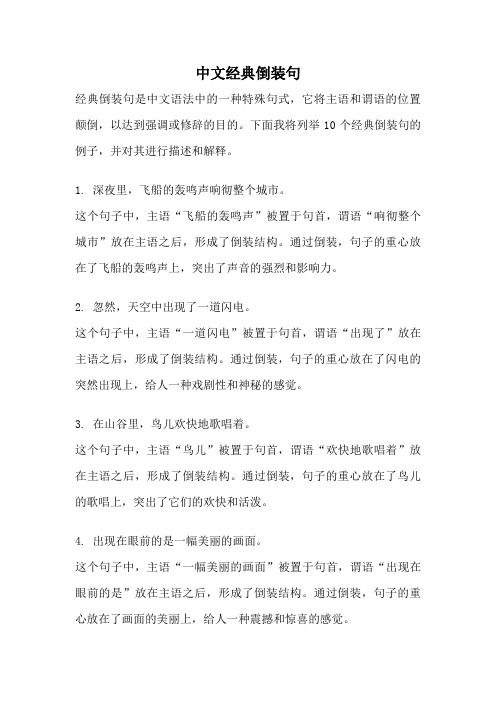
中文经典倒装句经典倒装句是中文语法中的一种特殊句式,它将主语和谓语的位置颠倒,以达到强调或修辞的目的。
下面我将列举10个经典倒装句的例子,并对其进行描述和解释。
1. 深夜里,飞船的轰鸣声响彻整个城市。
这个句子中,主语“飞船的轰鸣声”被置于句首,谓语“响彻整个城市”放在主语之后,形成了倒装结构。
通过倒装,句子的重心放在了飞船的轰鸣声上,突出了声音的强烈和影响力。
2. 忽然,天空中出现了一道闪电。
这个句子中,主语“一道闪电”被置于句首,谓语“出现了”放在主语之后,形成了倒装结构。
通过倒装,句子的重心放在了闪电的突然出现上,给人一种戏剧性和神秘的感觉。
3. 在山谷里,鸟儿欢快地歌唱着。
这个句子中,主语“鸟儿”被置于句首,谓语“欢快地歌唱着”放在主语之后,形成了倒装结构。
通过倒装,句子的重心放在了鸟儿的歌唱上,突出了它们的欢快和活泼。
4. 出现在眼前的是一幅美丽的画面。
这个句子中,主语“一幅美丽的画面”被置于句首,谓语“出现在眼前的是”放在主语之后,形成了倒装结构。
通过倒装,句子的重心放在了画面的美丽上,给人一种震撼和惊喜的感觉。
5. 随着时间的推移,人们的观念也在不断变化。
这个句子中,主语“人们的观念”被置于句首,谓语“在不断变化”放在主语之后,形成了倒装结构。
通过倒装,句子的重心放在了观念的变化上,强调了时间的推移和变化的不可逆转性。
6. 站在高山之巅,我仿佛可以触摸到天空。
这个句子中,主语“我”被置于句首,谓语“可以触摸到天空”放在主语之后,形成了倒装结构。
通过倒装,句子的重心放在了我与天空的亲近上,给人一种壮观和宏伟的感觉。
7. 无论发生什么事情,我们都不会放弃。
这个句子中,主语“我们”被置于句首,谓语“不会放弃”放在主语之后,形成了倒装结构。
通过倒装,句子的重心放在了我们的坚持上,强调了对困难的抵抗和坚决态度。
8. 在黑暗中,他发现了一束微弱的光芒。
这个句子中,主语“一束微弱的光芒”被置于句首,谓语“发现了”放在主语之后,形成了倒装结构。
倒装句子((精选))

12. ____ a mobile phone can you ring ___ you want to talk with anywhere. A. Using; whoever B. Only on; whoever C. With; whoever D. Using; whomever
2. Rewrite these sentence using normal word order.
1) I did not know how to use that recorder. Neither did he. I did not know how to use that recorder and he did not know, either.
no time, not only 等否定词开头的句子 里。 Never shall I do this again. At no time can you say “no” to the order. Little do I dream I would see you here.
Seldom have we felt as comfortable as here. Not only did he hear it, but he saw it as well. At no time was the entrance left unguarded.
8. Little ___ know about verbs, Franz __ his head. A. did he; dare not lift B. he; dare not lift C. did he; dare not to lift D. doesn’t; doesn’t dare lift
十句简单的倒装句
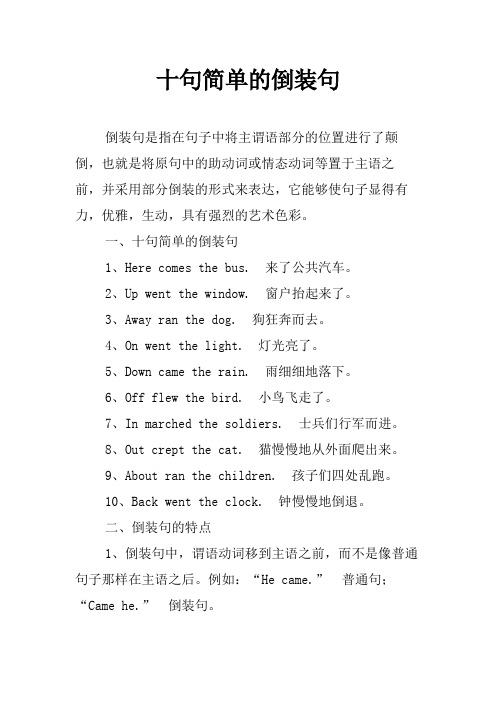
十句简单的倒装句倒装句是指在句子中将主谓语部分的位置进行了颠倒,也就是将原句中的助动词或情态动词等置于主语之前,并采用部分倒装的形式来表达,它能够使句子显得有力,优雅,生动,具有强烈的艺术色彩。
一、十句简单的倒装句1、Here comes the bus. 来了公共汽车。
2、Up went the window. 窗户抬起来了。
3、Away ran the dog. 狗狂奔而去。
4、On went the light. 灯光亮了。
5、Down came the rain. 雨细细地落下。
6、Off flew the bird. 小鸟飞走了。
7、In marched the soldiers. 士兵们行军而进。
8、Out crept the cat. 猫慢慢地从外面爬出来。
9、About ran the children. 孩子们四处乱跑。
10、Back went the clock. 钟慢慢地倒退。
二、倒装句的特点1、倒装句中,谓语动词移到主语之前,而不是像普通句子那样在主语之后。
例如:“He came.” 普通句;“Came he.” 倒装句。
2、倒装句中,常常伴随着一些表示强调的词,如only,ever,hardly,scarcely,never,seldom等,这些词一般都位于主语之前,它们修饰的元素也要倒装,如:“Never have I seen such a beautiful scene.”3、倒装句中,还可以有“there + be”结构,be动词要倒装,如:“There were five students in the classroom.”4、倒装句中,也可以用so和neither来引导,如:“So fast did he run that he won the race.” “Neither do I agree with you.”5、倒装句中,也可以用助动词或情态动词来引导,如:“Can he speak English?” “Speak English can he?”三、倒装句的应用1、强调句强调句就是要把句中强调的词或短语倒装,来表达强调的意思。
句子的倒装与部分倒装
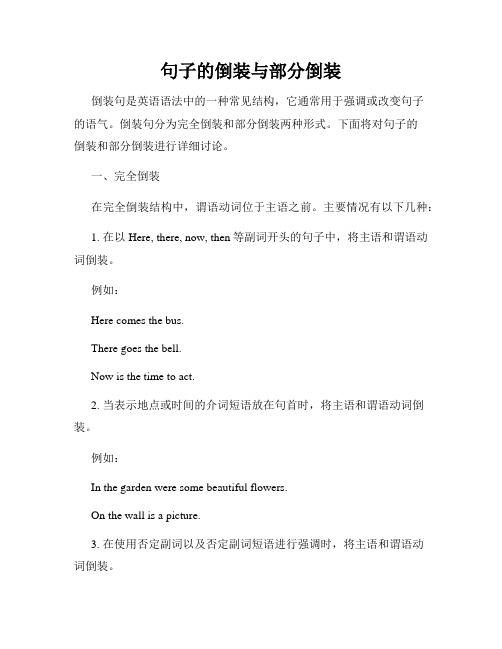
句子的倒装与部分倒装倒装句是英语语法中的一种常见结构,它通常用于强调或改变句子的语气。
倒装句分为完全倒装和部分倒装两种形式。
下面将对句子的倒装和部分倒装进行详细讨论。
一、完全倒装在完全倒装结构中,谓语动词位于主语之前。
主要情况有以下几种:1. 在以Here, there, now, then等副词开头的句子中,将主语和谓语动词倒装。
例如:Here comes the bus.There goes the bell.Now is the time to act.2. 当表示地点或时间的介词短语放在句首时,将主语和谓语动词倒装。
例如:In the garden were some beautiful flowers.On the wall is a picture.3. 在使用否定副词以及否定副词短语进行强调时,将主语和谓语动词倒装。
例如:Never have I seen such a beautiful sunset.Not only is he a great musician, but also a talented writer.4. 在祈使句中,将谓语动词放在句首。
例如:Go away!Be quiet!二、部分倒装部分倒装句是指将助动词、情态动词或者be动词与主语之间的顺序颠倒。
常见情况包括:1. 否定副词或者词组放在句首进行强调时,将助动词、情态动词或be动词与主语之间的顺序颠倒。
例如:Under no circumstances should you give up.By no means will I forgive him.2. 在条件句中,将主语和谓语中的助动词、情态动词或者be动词倒装。
例如:Had I known the truth, I wouldn't have trusted him.Should you need any help, feel free to ask.3. 在含有only, hardly, little, seldom等词的句子中,将助动词、情态动词或be动词与主语之间的顺序颠倒。
倒装句的几种类型
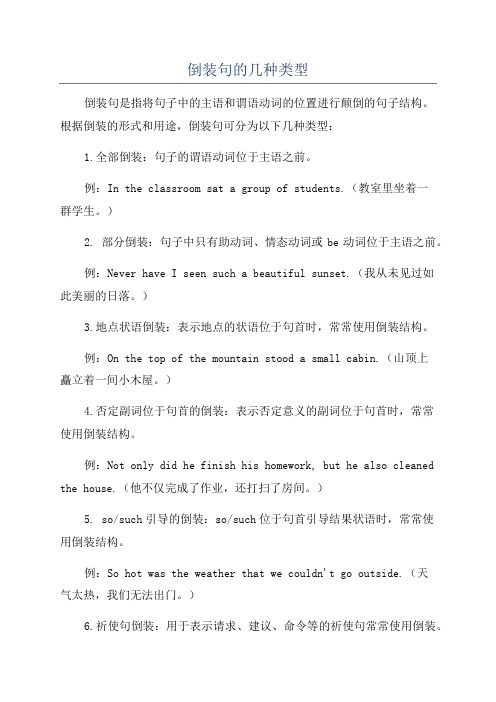
倒装句的几种类型倒装句是指将句子中的主语和谓语动词的位置进行颠倒的句子结构。
根据倒装的形式和用途,倒装句可分为以下几种类型:1.全部倒装:句子的谓语动词位于主语之前。
例:In the classroom sat a group of students.(教室里坐着一群学生。
)2. 部分倒装:句子中只有助动词、情态动词或be动词位于主语之前。
例:Never have I seen such a beautiful sunset.(我从未见过如此美丽的日落。
)3.地点状语倒装:表示地点的状语位于句首时,常常使用倒装结构。
例:On the top of the mountain stood a small cabin.(山顶上矗立着一间小木屋。
)4.否定副词位于句首的倒装:表示否定意义的副词位于句首时,常常使用倒装结构。
例:Not only did he finish his homework, but he also cleaned the house.(他不仅完成了作业,还打扫了房间。
)5. so/such引导的倒装:so/such位于句首引导结果状语时,常常使用倒装结构。
例:So hot was the weather that we couldn't go outside.(天气太热,我们无法出门。
)6.祈使句倒装:用于表示请求、建议、命令等的祈使句常常使用倒装。
例:Turn off the lights, please.(请关灯。
)请注意,不同的语境和语法结构可能会产生不同的倒装现象,以上只列举了一些常见的倒装句类型。
句子的倒装结构解析
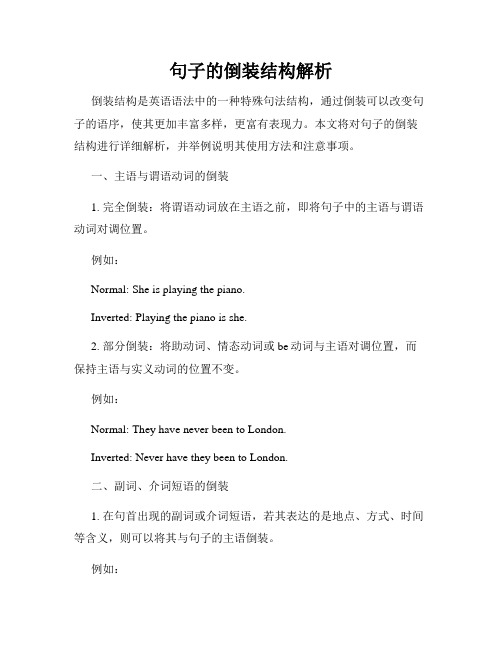
句子的倒装结构解析倒装结构是英语语法中的一种特殊句法结构,通过倒装可以改变句子的语序,使其更加丰富多样,更富有表现力。
本文将对句子的倒装结构进行详细解析,并举例说明其使用方法和注意事项。
一、主语与谓语动词的倒装1. 完全倒装:将谓语动词放在主语之前,即将句子中的主语与谓语动词对调位置。
例如:Normal: She is playing the piano.Inverted: Playing the piano is she.2. 部分倒装:将助动词、情态动词或be动词与主语对调位置,而保持主语与实义动词的位置不变。
例如:Normal: They have never been to London.Inverted: Never have they been to London.二、副词、介词短语的倒装1. 在句首出现的副词或介词短语,若其表达的是地点、方式、时间等含义,则可以将其与句子的主语倒装。
例如:Normal: Up the hill ran the children.Inverted: Up the hill the children ran.2. 在表示否定意义的副词或短语前,可将其与情态动词、助动词或be动词倒装。
例如:Normal: He never goes to parties.Inverted: Never does he go to parties.三、疑问句的倒装1. 一般疑问句的倒装:将助动词、情态动词或be动词与主语调换位置。
例如:Normal: Are you going to the party?Inverted: Are you going to the party?2. 特殊疑问句的倒装:将疑问词与助动词、情态动词或be动词调换位置。
例如:Normal: Where did you go yesterday?Inverted: Where did you go yesterday?四、条件句的倒装1. 条件句中出现的倒装:将had, should, were等词与主语倒装。
- 1、下载文档前请自行甄别文档内容的完整性,平台不提供额外的编辑、内容补充、找答案等附加服务。
- 2、"仅部分预览"的文档,不可在线预览部分如存在完整性等问题,可反馈申请退款(可完整预览的文档不适用该条件!)。
- 3、如文档侵犯您的权益,请联系客服反馈,我们会尽快为您处理(人工客服工作时间:9:00-18:30)。
英语最基本的语序是主语在前,谓语动词在后。
但有时由于句子结构的需要或表示强调,就要采用倒装形式。
将谓语动词完全移到主语之前称为完全倒装,只将助动词或情态动词放到主语之前称为部分倒装。
强调性倒装和以so, neither, nor开头的句子是高考例题的热点。
(一)倒装句的意义1、适应一定的语法结构的需要,主要是指疑问句句型结构的需要。
e.g. May I come in?Was the People's Liberation Army founded in 1927?2、为了强调某一部分,而把这部分放到句首,构成倒装。
e.g. Never have I been late for school this term.So early did he come to school that no other students came.(二)倒装的使用情况1、在"there be" 结构里,there是引导词,主语在be后。
e.g. There is a box on the table.2、在疑问句中。
e.g. Is she singing in the classroom?What does your mother do?3、在here, there等副词开头的某些句子里(要用一般现在时态)。
如果主语是人称代词,主语和主要动词的词序不变。
(完全倒装)e.g. There goes the bell.Here is an apple for you.There she comes.4、重复倒装句型,用在以so, nor, neither开头,表示谓语所述的情况也适用于另一个人或一事物的肯定或否定句中。
so用于肯定句,表示"也一样"、"也这样";nor, neither用于否定句,表示"同样也不,也不这样"。
e.g. I am watching TV. So is she.My parents didn't watch TV last night. Neither (Nor) did I.5、直接引语的全部或一部分放在句首时,主句中的主谓也常直接倒装。
(完全倒装)e.g. "Very well," said the French student."Bring me two eggs and a cup of tea, please." said he.6、在以never, little, hardly, not only, few, not, seldom等否定副词开头的句子中,采用部分倒装。
如不放在句首就不要倒装。
e.g. Little did he say at the meeting.Never shall I forget the day when I joined the Army.比较:I shall never forget the day when I joined the Army.7、用于以only所修饰的副词、介词短语或状语从句的句子中。
e.g. Only when the war was over in 1918 was he able to get happily back to wrk.Only in this way can we learn English well.注意:如果only后的词组不是状语,不需倒装。
e.g. Only Wang Lili knows this.8、为了表达生动,有时把表地点、方位的副词,如up, down, out, away, in等放在句首,同时把谓语动词放在主语之前。
若主语为人称代词,主语和谓语动词的位置不变,只将副词放在句首。
(完全倒装)e.g. Away hurried the boy.Out rushed the girl.9、在虚拟结构中,条件从句的谓语含有were, had 和should这三个词是,可省去if,将这些词移至主语之前。
e.g. Had I time (= If I had time), I would go and help you.Were I you (= If I were you), I would go abroad.Should he come (=If he should come), tell him to ring me up.10、as引导让步状语从句时要倒装(形容词/ 副词/ 名词/ 动词+ as + 主语+ 谓语)。
e.g. Proud as they are, they are afraid to see me.Child as he is, he seems to know everything.(child前不加冠词)Hard as he worded, he made little progress.11、用于某些表示祝愿的句子里。
e.g. May you succeed!Long live the People's Republic of China!12、So + 形容词、副词及such 置于句首时要倒装。
So happy did he feel. Such was me.1. Not until I began to work ____ how much time I had wasted.A. didn't I realizeB. did I realizeC. I didn't realizeD. I realized2. Only by practising a few hours every day ____ be able to master the language.A. you canB. can youC. you willD. will you3. If you don't go, neither ____.A. shall IB. do IC. I doD. I shall4. No sooner ____ to the station ____ the train left.A. had I got, whenB. I had got, thanC. had I got, thanD. did I get, when5. ---- Your father is very strict with you. ---- ____. He never lets off a single mistake of oursA. So he isB. So is heC. He is soD. So does he6. ____ today, he would get there by Sunday.A. Would he leaveB. Was he leavingC. Were he to leaveD. If he leave7. Never in my life ____ such a thing. A. I have heard or have seenB. have I heard or seenC. I have heard or seenD. did I hear or see8. ---- Here ____! Where is Xiao Liu? ---- There ____.A. comes the bus, is heB. comes the bus, he isC. the bus comes, is heD. the bus comes, he is9. ____ , I will not buy it.A. Much as do I like itB. As much I like itC. Much as I like itD. As I like it much10. ---- I like football. I don't like volleyball. ---- ____.A. So do IB. Neither do IC. So it is with meD. So is it with me11._____ the expense, I _____ to Italy.A. If it were not, goB. Were it not for, would goC. Weren't it for, will goD. If it hadn t been, would have gone12. So _____ in the darkness that he didn' t dare to move an inch.A. he was frightenedB. was he frightenedC. frightened he wasD. frightened was he13.-In modem times, girls like beautiful clothes.-Yes, _____ and boys. After all, our life has greatly improved.A. so do they; so do youB. so they do; so you doC. so do they; so you doD. so they do; so do you14.-You have an English class every day except Sunday. --- _____.A. So we haveB. So we doC. So have weD. So do we15.1 wonder if your wife will go to the ball. If your wife _____, so _____ mine.A. does; willB.will; doesC.will; wouldD.does; do16. Only after I read the text over again _____ its main idea.A. that I knewB.did I knewC. 1 could knowD. I did know17.-You seem to have learned all the English words by heart.A.Sol doB.SodolC. So I haveD. So have 118. -I seldom watch TV, but listen to the radio a lot.A. So do IB. Neither do IC. I m the sameD. So it is with me19. So excited _____ that he couldn't say a word.A. he seemedB. did he seemC. was he seemingD. he did look20. Jimmy was so nervous not a single word _____ down in the dictation.A. he wroteB. he was writtenC. did he writeD. was he written21. Little ______ when 1 took the trip where it would lead me.A. have I knownB. had I knownC. do 1 knowD. did I know22. -Have you ever seen anything like that before? - ____.A. No, I never have seen anything like that beforeB. No, never I have seen anything like that beforeC. No, never have 1 seen anything like that beforeD. No, I have seen anything like that before never23. _____ , 1 would accept the invitation and go to the party.A. Were I youB. Was I youC. Had I been youD. Would 1 be you24. You should work less _____.A. and neither should IB. and so should IC. and nor should ID. and so I should25. _____ and caught the mouse.A. Up the cat jumpedB. The cat up jumpedC. Up jumped the catD. Jumped up the cat26. Not only _____ a promise, but also he kept it.A. did he makeB. he madeC. does he makeD. has he made27. His uncle is a worker and has been working in the factory for more than ten years. _____.A. So is his auntB. So has his auntC. So his aunt doesD. So it is with his aunt28. Not once _____ their plan.A. did they changeB. they changedC. changed theyD. they did change29.-Do you know Jim quarreled with his brother? -I don't know, and ______ .A. nor don't I careB. nor do I careC. I don't care neitherD. I don't care also30. Not until he arrived home _____ he find that this wallet had been stolen.A. didB. wouldC. whenD. that31. -This is one of the oldest trees in the world. - _____ such a big tree.A. Never I have seenB. I haven't never seenC. Never have I seenD. I have seen never32. Nowhere else in the world _____ cheaper tailoring(裁缝业, 成衣业)than in Hong Kong.A. a tourist can findB. can a tourist findC. a tourist will findD. a tourist has found33. _____ succeed in doing anything.A. Only by working hard we canB. By only working hard we canC. Only we can by working hardD. Only by working hard can we34. _____ that we all went out, lying in the sun.A. So fine was the weatherB. So was the fine weatherC. The weather was so fine wasD. So the weather was tine35. ____ a nice man ____ that we all believe him.A. So; did he seemB. So; he seemedC. Such; he seemedD. Such; did he seem36. -You seem to be an actor. -_____. I have played many parts in a lot of films.A. So do IB. So am IC. So I doD. So I am37. Not only ____ working hard, but also ____ very polite.A. the boy is; he isB. is the boy; he isC. the boy is; is heD. is the boy; is he38. _____ , he never seems able to do the work beautifully.A. Try as he doesB. As he triesC. Try as does heD. As try he does39.-I cannot see the picture well from here. - _____.A. Neither can t IB. Neither I canC. I can't neitherD. Neither can I40.- You ought to have given them some advice - _____, but who cared what I asked?A. So ought youB. So 1 oughtC. So it wasD. So I did41. So carelessly _____ that he almost killed himself.A. he drivesB. does he driveC. did he driveD. he drove42. Little _____ about his own health though he was very ill.A. he caredB. did he careC. he caresD. does he care43. Well ____ know him and well ____ know me.A. I did; he didB. did I; he didC. did I; did heD. I did; did he44. No sooner ____ they rushed out into the street.A. did they hear the news thanB. did they hear the news whenC. had they heard the news thanD. had they heard the news when45. Little wonder _____ up their hands in dismay.A. have some thrownB. some have thrownC. thrown some haveD. have thrown some46. _____ , he would have passed the exam.A. If he were to studyB. If he studied hardC. Had he studied hardD. Should he study hard47. We were lucky enough, for no sooner _____ home _____ it rained.A. we returned; andB. we had returned; whenC.did we return; whenD. had we returned; than48. So little _____ agree on the plan that they could not settle their difference.A. did theyB. do theyC. they didD. they did not49. _____ he realized it was too late to return home.A. No sooner it grew dark thanB. Hardly did it grow dark whenC. It was not until dark thatD. It was until dark that语法复习七:倒装句1~5 BDACA 6~10 CBBCC 11~15 BDDBA 16~20 BADBC 21~25 DCABC 26~30 ADABA 31~35 CBDAD 36~40 DBADD 41~45 CBCCB 46~49 CDAC。
